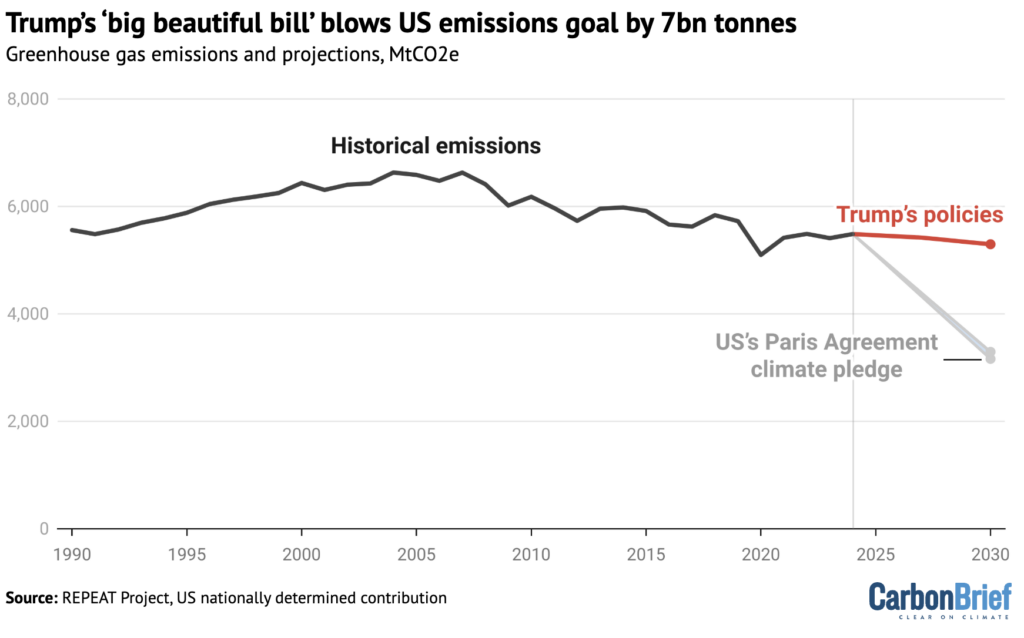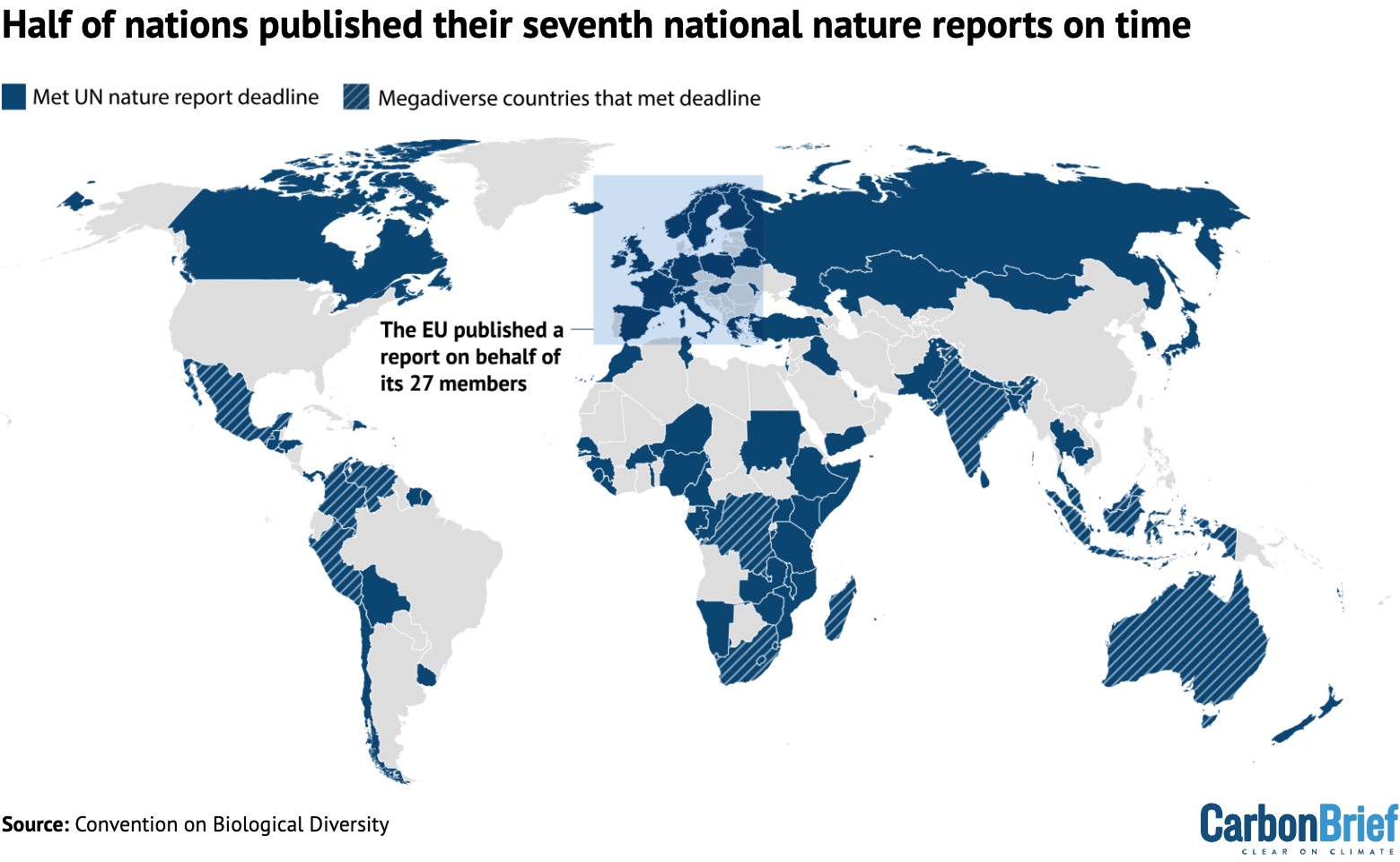Welcome to Carbon Brief’s DeBriefed.
An essential guide to the week’s key developments relating to climate change.
This week
Congress passes Trump’s ‘megabill’
TAX CREDITS CRUSHED: A major budget bill passed by US congress this week is “poised to remake American energy by slashing tax breaks for wind and solar power and electric cars”, reported the New York Times. The legislation, which was “muscled” through by Republicans, “provides a boost to fossil fuels and dismantles many of the biggest actions the federal government has ever taken to fight climate change”, the newspaper said.
‘CRACKDOWN’: The version of the bill approved by the Senate on Tuesday included “compromise language” that gave wind and solar projects one year to begin construction to claim current tax credits, noted Politico. “Hard-line” Republicans in the House of Representatives told the outlet that they backed the bill only after receiving assurances from Donald Trump that he would use executive action to further “constrict” wind and solar.
LAB LIABILITY: The bill, which is expected to be signed by Trump today, also “seeks to defund” multiple climate labs, according to CNN. This includes the Mauno Lao laboratory in Hawaii, where measurements since 1958 have produced the iconic “Keeling Curve” of rising atmospheric CO2, the outlet noted. See below for more on the emissions impact of Trump’s bill.
Record-breaking heatwave ‘grips’ Europe
RED ALERTS: At least eight people died across Europe as a heatwave gripped much of the continent, reported Reuters, “triggering health alerts and forest fires and forcing the closure of a nuclear reactor at a Swiss power plant”. The New York Times quoted UN secretary general António Guterres, who said: “Extreme heat is no longer a rare event – it has become the new normal.”
RECORD-BREAKING: Both Spain and England had their hottest June on record, noted BBC News, with the Spanish weather service saying the average of 23.6C “pulverised records”. The outlet added that France registered its second-hottest June, while the Guardian reported that Portugal hit a provisional record high for June of 46.6C.
FLASH FLOODS: Elsewhere, a record downpour in the central Chinese province of Hubei brought a month’s worth of rain in just 12 hours to the city of Xianfeng, reported Reuters. Authorities moved 18,000 people to safety, the newswire said. Flooding in India’s northern state of Himachal Pradesh left five people dead, reported the Hindustan Times.
Around the world
- ‘WATER[ED] DOWN’: The European Commission’s newly proposed target to cut the EU’s carbon emissions by 90% by 2040 has been criticised for allowing up to 3% of the goal to be met with international carbon credits, reported Carbon Brief.
- BRAZIL OIL BID: Brazil’s COP30 president-designate, André Corrêa do Lago, has “played down concerns” on Brazil’s oil expansion after a new analysis found the nation will drive a surge in new production by 2030, reported the Financial Times.
- ‘REPUTATIONAL RISK’: The nomination of an economist from the Saudi Aramco oil company as a coordinating lead author for an Intergovernmental Panel on Climate Change report has been denounced as “political capture”, reported Politico.
- FLIGHT FEE: A group of countries, including France, Kenya and Barbados, have pledged to tax private jets and premium-class flying in a bid to raise funds for climate action at a summit in Spain, Reuters reported. Climate Home News has all the key climate-finance takeaways from the event.
- ‘MAJOR SETBACK’: A £65m satellite launched last year to detect methane emissions from oil and gas production has been “lost in space”, reported BBC News.
£528m
The amount by which “climate aid” given by the UK government to developing countries was inflated through controversial changes to the way climate finance is now being designated, Carbon Brief analysis showed.
Latest climate research
- Sustained cuts to US military spending could result in annual energy savings by 2032 equivalent to the energy consumption of Slovenia, a study in PLOS Climate found.
- Using satellite data, a study in the Proceedings of the National Academy of Sciences revealed a marked increase in surface salinity across the Southern Ocean since 2015, coinciding with a “dramatic decline” in Antarctic sea ice.
- Research in Nature Cities highlighted the “disproportionate flood exposure” faced by urban slum populations in the global south, with one in three living on a floodplain.
(For more, see Carbon Brief’s in-depth daily summaries of the top climate news stories on Monday, Tuesday, Wednesday, Thursday and Friday.)
Captured

Trump’s dismantling of climate policy means the US will add an extra 7bn tonnes of emissions to the atmosphere from now until 2030, compared to meeting its former climate pledge under the Paris Agreement, according to new Carbon Brief analysis of modelling from Princeton University. The approval of Trump’s megabill repealing clean-energy tax credits, alongside a series of executive orders, means that US emissions are now set to drop to just 3% below current levels by 2030 – effectively flatlining – rather than falling 40% as required to hit the now-defunct target, according to the analysis.
Spotlight
Tipping points that worry scientists the most
This week, delegates at the Global Tipping Points 2025 conference in Exeter tell Carbon Brief which potential tipping “element” in the Earth system they are most worried about.
Prof Tim Lenton, founding director of the Global Systems Institute and chair in climate change and Earth system science at the University of Exeter:
“The Atlantic Meridional Overturning Circulation, or AMOC, for sure. The consequences of crashing that would be devastating globally – and also for where I live in the UK. By our own calculation, we could have less than half the viable area for growing a couple of major staple crops, wheat and maize, worldwide. We would have a widespread water crisis. We could have collapses of the monsoons in West Africa and India that would displace hundreds of millions of people. It is hard to see that in anything other than a catastrophe.”
Prof Ricarda Winkelmann, founding director of the Max Planck Institute of Geoanthropology and professor of climate system analysis at the University of Potsdam:
“So I am thinking about this from a risk perspective – so both the likelihood as well as the impacts – and I think the answer depends on that. Because when it comes to the likelihood and the particular threshold – and we know about those – I’m mostly concerned about the Greenland and the West Antarctic ice sheets. This is because we know that, even at lower warming levels, they’re already at risk of transgressing tipping points in certain regions.
“But when it comes to the impacts and also the timescales over which those play out, there are other tipping elements that worry me most. In particular, regional tipping elements. So, if we think of the mountain glaciers, for instance, these impacts are already experienced right now and several mountain glaciers are undergoing these accelerated changes.”
Prof Gabi Hegerl, chair in climate system science in the school of geosciences at the University of Edinburgh:
“I am worried about all of them. But, for the immediate future, I am particularly worried about tipping points that involve the biosphere and humans due to breaching thresholds for heat or drought that then ripple into food availability, livelihood and ecosystems. The Earth system tipping points will do that, too, but maybe a little bit later. Examples are coral diebacks triggered by marine heatwaves, forest change and fires, and droughts threatening livelihoods and putting people on the move.
“I did a research project on the US dustbowl and the trigger was drought causing vegetation and crop dieback, then [leading to] extreme heat and dust storms in response – and migration, as memorialised in [the 1939 John Steinbeck novel] The Grapes of Wrath. And, now with warming, all droughts get supercharged.”
Prof Carlos Nobre, Brazilian scientist and meteorologist who spearheaded the multi-disciplinary, multinational large-scale biosphere-atmosphere experiment in the Amazon:
“The Amazon is a very serious tipping point, because [dieback] could release around 250bn tonnes of CO2 by 2100 – which will make it impossible to [limit global warming] at 1.5C. We could also lose the largest [host to] biodiversity on the planet, which would induce a tremendous, large number of epidemics and several pandemics. Also, of course, the Amazon forest controls aspects of the global climate. In South America, the climate is entirely controlled by the Amazon forest.”
Carbon Brief will publish further coverage of the Global Tipping Points conference next week.
Watch, read, listen
‘CLIMATE ACTION IS UNSTOPPABLE’: In a talk at the recent TED Countdown Summit 2025 in Nairobi, former US vice-president Al Gore explained why the narrative of “climate realism” is a “myth”.
PROTESTOR IN PRISON: A BBC Radio 4 Currently documentary followed the story of a “law-abiding Middle England mum”, who received a four-year prison sentence for a Just Stop Oil protest on the M25 motorway.
‘FROM THE GREEN TO THE UNSEEN’: In its L is for Labour YouTube show, the Migration Project asked what a “just transition” to electric vehicles would look like for the traditional automotive industry and its workers in India.
Coming up
- 6-7 July: 17th BRICS summit, Rio de Janeiro, Brazil
- 8-11 July: AI For Good global summit 2025, Geneva, Switzerland
- 7-11 July: 47th Meeting of the Open-ended Working Group of the Parties to the Montreal Protocol, Bangkok, Thailand
Pick of the jobs
- Climate Policy Initiative, senior communications associate, climate finance | Salary: Unknown. Location: Cape Town, South Africa
- Global Action Plan, partnerships manager and campaigner | Salary: £36,000 and £36,000-£45,000, respectively. Location: London
- European Bank for Reconstruction and Development, principal manager, nature & climate finance | Salary: Unknown. Location: London
- Cheltenham Borough Council, climate and decarbonisation manager | Salary: £47,227-52,547. Location: Cheltenham, UK
DeBriefed is edited by Daisy Dunne. Please send any tips or feedback to debriefed@carbonbrief.org.
This is an online version of Carbon Brief’s weekly DeBriefed email newsletter. Subscribe for free here.
The post DeBriefed 4 July 2025: Trump ‘megabill’ guts clean energy; Europe’s record heat; Scientists discuss ‘most worrying’ tipping points appeared first on Carbon Brief.
Climate Change
Analysis: Half of nations meet UN deadline for nature-loss reporting
Half of nations have met a UN deadline to report on how they are tackling nature loss within their borders, Carbon Brief analysis shows.
This includes 11 of the 17 “megadiverse nations”, countries that account for 70% of Earth’s biodiversity.
It also includes all of the G7 nations apart from the US, which is not part of the world’s nature treaty.
All 196 countries that are part of the UN biodiversity treaty were due to submit their seventh “national reports” by 28 February, of which 98 have done so.
Their submissions are supposed to provide key information for an upcoming global report on actions to halt and reverse biodiversity loss by 2030, in addition to a global review of progress due to be conducted by countries at the COP17 nature summit in Armenia in October this year.
At biodiversity talks in Rome in February, UN officials said that national reports submitted late will not be included in the global report due to a lack of time, but could still be considered in the global review.
Tracking nature action
In 2022, nations signed a landmark deal to halt and reverse nature loss by 2030, known as the “Kunming-Montreal Global Biodiversity Framework” (GBF).
In an effort to make sure countries take action at the domestic level, the GBF included an “implementation schedule”, involving the publishing of new national plans in 2024 and new national reports in 2026.
The two sets of documents were to inform both a global report and a global review, to be conducted by countries at COP17 in Armenia later this year. (This schedule mirrors the one set out for tackling climate change under the Paris Agreement.)
The deadline for nations’ seventh national reports, which contain information on their progress towards meeting the 23 targets of the GBF based on a set of key indicators, was 28 February 2026.
According to Carbon Brief’s analysis of the UN Convention on Biological Diversity’s online reporting platform, 98 out of the 196 countries that are part of the nature convention (50%) submitted on time.
The map below shows countries that submitted their seventh national reports by the UN’s deadline.

This includes 11 of the 17 “megadiverse nations” that account for 70% of Earth’s biodiversity.
The megadiverse nations to meet the deadline were India, Venezuela, Indonesia, Madagascar, Peru, Malaysia, South Africa, Colombia, Mexico, the Democratic Republic of the Congo and Australia.
It also includes all of the G7 nations (France, Germany, the UK, Japan, Italy and Canada), excluding the US, which has never ratified the Convention on Biological Diversity.
The UK’s seventh national report shows that it is currently on track to meet just three of the GBF’s 23 targets.
This is according to a LinkedIn post from Dr David Cooper, former executive secretary of the CBD and current chair of the UK’s Joint Nature Conservation Committee, which coordinated the UK’s seventh national report,
The report shows the UK is not on track to meet one of the headline targets of the GBF, which is to protect 30% of land and sea for nature by 2030.
It reports that the proportion of land protected for nature is 7% in England, 18% in Scotland and 9% in Northern Ireland. (The figure is not given for Wales.)
National plans
In addition to the national reports, the upcoming global report and review will draw on countries’ national plans.
Countries were meant to have submitted their new national plans, known as “national biodiversity strategies and action plans” (NBSAPs), by the start of COP16 in October 2024.
A joint investigation by Carbon Brief and the Guardian found that only 15% of member countries met that deadline.
Since then, the percentage of countries that have submitted a new NBSAP has risen to 39%.
According to the GBF and its underlying documents, countries that were “not in a position” to meet the deadline to submit NBSAPs ahead of COP16 were requested to instead submit national targets. These submissions simply list biodiversity targets that countries will aim for, without an accompanying plan for how they will be achieved.
As of 2 March, 78% of nations had submitted national targets.
At biodiversity talks in Rome in February, UN officials said that national reports submitted late will not be included in the global report due to a lack of time, but could still be considered in the global review.
Funding ‘delays’
At the Rome talks, some countries raised that they had faced “difficulties in submitting [their national reports] on time”, according to the Earth Negotiations Bulletin.
Speaking on behalf of “many” countries, Fiji said that there had been “technical and financial constraints faced by parties” in the preparation of their seventh national reports.
In a statement to Carbon Brief, a spokesperson for the Global Environment Facility, the body in charge of providing financial and technical assistance to countries for the preparation of their national reports, said “delays in fund disbursement have occurred in some cases”, adding:
“In 2023, the GEF council approved support for the development of NBSAPs and the seventh national reports for all 139 eligible countries that requested assistance. This includes national grants of up to $450,000 per country and $6m in global technical assistance delivered through the UN Development Programme and UN Environment Programme.
“As of the end of January 2026, all 139 participating countries had benefited from technical assistance and 93% had accessed their national grants, with 11 countries yet to receive their funds. Delays in fund disbursement have occurred in some cases, compounded by procurement challenges and limited availability of technical expertise.”
The spokesperson added that the fund will “continue to engage closely with agencies and countries to support timely completion of NBSAPs and the seventh national reports”.
The post Analysis: Half of nations meet UN deadline for nature-loss reporting appeared first on Carbon Brief.
Analysis: Half of nations meet UN deadline for nature-loss reporting
Climate Change
Dow Asks Texas to Legalize Plastic Pollution from its Seadrift Complex
Facing multiple lawsuits, Dow requests an “unprecedented” permit amendment to authorize its discharge of polyethylene pellets into coastal waters.
Two weeks ago, when Texas sued a massive Dow petrochemical plant over water pollution, state environmental regulators were already considering a novel proposal from the company that would effectively legalize discharges of plastic material from the 4,700–acre complex into waters feeding San Antonio Bay and the Gulf of Mexico.
Dow Asks Texas to Legalize Plastic Pollution from its Seadrift Complex
Climate Change
Why Electricity Bills Are So High—and How the Blowback Could Hit Trump
As Democrats and climate activists seize on energy costs as a political issue, new data shows electricity rates rose 5 percent nationwide in 2025. The figures were much higher in some states.
COLUMBUS, Ohio—Protestors stood in the snow outside the offices of Ohio’s utility regulator in January to say they were fed up with rising electricity rates.
Why Electricity Bills Are So High—and How the Blowback Could Hit Trump
-
Greenhouse Gases7 months ago
Guest post: Why China is still building new coal – and when it might stop
-
Climate Change7 months ago
Guest post: Why China is still building new coal – and when it might stop
-

 Greenhouse Gases2 years ago
Greenhouse Gases2 years ago嘉宾来稿:满足中国增长的用电需求 光伏加储能“比新建煤电更实惠”
-
Climate Change2 years ago
Bill Discounting Climate Change in Florida’s Energy Policy Awaits DeSantis’ Approval
-
Climate Change2 years ago
Spanish-language misinformation on renewable energy spreads online, report shows
-

 Climate Change2 years ago
Climate Change2 years ago嘉宾来稿:满足中国增长的用电需求 光伏加储能“比新建煤电更实惠”
-
Climate Change Videos2 years ago
The toxic gas flares fuelling Nigeria’s climate change – BBC News
-

 Carbon Footprint2 years ago
Carbon Footprint2 years agoUS SEC’s Climate Disclosure Rules Spur Renewed Interest in Carbon Credits









